Though the Storm Rages is a series of 12 weekly reflections written to encourage believers who are experiencing the COVID-19 pandemic. We don’t just want to get through this tough period until it’s over. We want to get deeper with God as we reflect thoughtfully during these unsettling times about what He would want us to learn and how He would want us to respond.
In Matthew 7:24-29, Jesus says that the storms of life will come and threaten to demolish everything in the way, yet those who take His words to heart will stand as firm as a house built on a rock-solid foundation. The storm has arrived in the form of a global pandemic, but we can stand firm in its wake when we pay careful attention to God’s word and commit to it.
Though the storm rages, our faith is in God who comforts and strengthens us through it until He delivers us.
49. 65. 75. 120. 66. 106. 142, 287…
The numbers of new, daily Covid-19 cases in Singapore are scarily high this month. As the number escalates, so does our unease and anxiety.
Would I get the virus from going to work or taking public transport?
What would happen to my loved ones if I am infected?
Would I lose my job?
Suddenly, we seem to be at the mercy of an invisible and deadly foe that can strike at anyone, anytime, anywhere.
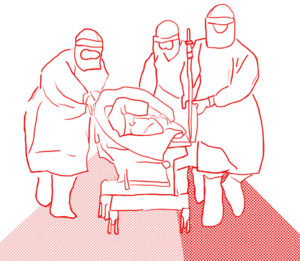
The global pandemic exposes the vulnerability and limitation of mankind like no other. People are fearful of contracting the virus, many have died, hospitals are overwhelmed, businesses are hit hard, governments are blindsided.
Before the pandemic, when things go according to plan, it may seem as if we can still control how our lives would turn out. The pandemic awakens us to the reality that we are merely mortal, vulnerable to the attacks of a tiny virus.
We mask up for fear of getting infected or infecting others. We struggle to cope with increasingly stricter laws that limit our movements. For some of us, our businesses are hanging by a thread. Now we are not so sure what tomorrow will bring.
Perhaps our troubles are a painful but merciful reminder that we are mere creatures whose lives are in the hands of our Creator.
We have always depended on God’s mercy even to stay alive, and this time is no different. And the truth is, whether we are infected or not, our time on earth is limited.
“Teach us to number our days, that we may gain a heart of wisdom.” writes Moses in Psalm 90:12. Moses pleads with God to help His people make sense of their brief lives on earth so that they would be wise to revere God. Mankind cannot live forever because of sin (Rom 6:23a) and the wise are those who repent of their sin and walk in righteousness with God.
With our mortality exposed, we have to decide. Would we acknowledge our limitations, or would we live in denial that we can make it on our own? Would we submit to God the Giver of life, or would we go about our days without a care for what He thinks?
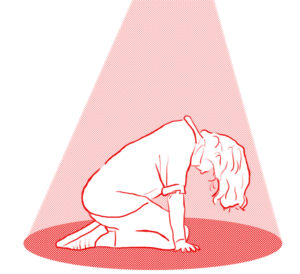
Perhaps God is using this difficult time to humble us before Him, to give Him the deep respect He deserves, to live in obedience to His Word (Ecc 12:13). “What a man is on his knees before God, that he is, and nothing more,” said Scottish preacher Robert Murray M’Cheyne.
Our lives are in the hands of the almighty God, who has authority over all of creation (Ps 33:6-9), diseases (Hab 3:5) and death (1 Cor 15:54-57). This can be scary because God can do whatever He wants with our lives, whether we agree with Him or not. But this can also be comforting because God is gracious in how He deals with us.
Just look at the cross. While we were still sinners who didn’t care about God, God sent His Son to die for our sins. We were not just weak humans; we were God’s enemies deserving of His punishment (Eph 2:1-3). But Jesus gave His life to secure for us forgiveness, so that God no longer sees believers as His enemies but as His children (Eph 1:5). Surely Someone who loves us this much can be trusted to lead us.
May God’s love on the cross encourage us to look to Him during these trying times on bended knees, eager to do His will.
______________________________
Reflect:
- Would you agree that the pandemic has exposed mankind’s limitations and vulnerability? Why?
- How has the pandemic affected you? What does it reveal about your ability to control your life?
- What are some ways you could be treating God casually? In your own words, describe what it means to give God the great respect He deserves. How can you do so today?
“Can my company survive through this?”
“My husband lost his job. Do we have enough savings?”
For most of us, it may have begun with questions of convenience such as attending a gym class. But two months after DORSCON Orange and two weeks after Circuit Breaker, stock markets have tumbled, jobs have been lost and health has faded. We now face a new set of questions.
The coronavirus has taken away our freedoms, our financial security and our preferred lifestyles. For some it may have even taken away our health and our lives. Throughout the world, it has shaken the things that we place our security upon. We tried to build our lives on the things of this world. The blueprint was comfort and stability. The bricks, determination and human capabilities. And now, it has crumbled like a house of cards.

In a period when the weakness of our earthly securities is exposed, what can we stand on?
“All people are like grass, and all their glory is like the flowers of the field; the grass withers and the flowers fall, but the word of the Lord endures forever.” 1 Peter 1:24-25
Peter quotes from Isaiah 40:6-8 as he reminds his audience that believers are born anew through the ‘living and abiding word of God’. Humans and humanly created things are like grass and flowers in that they will perish. But the word of the Lord, the saving message of the gospel that has been planted in the believers, will endure forever to give us life.
While earthly securities may wither away, the word of God, the message of the gospel, is our only security.
As this chapter continues to unfold, would we fill our days with reading and dwelling on the bad news that goes all around us? Or would we turn to studying and submitting to the good news that we have graciously received?
Would we focus on rebuilding our lives on the very ‘cards’ that have fallen? Or would we build our lives on the solid foundation of the word of God so that we will stand strong in every season (Matt 7:24-27)?

God reveals Himself through His word. This season can be an invitation for us to know Him anew. As we dive in, the Holy Spirit illuminates and brings understanding to young and mature believers alike. In that process, our lives will be transformed as we know again the God who loves us and reconciles sinners to Himself through Christ. “Nobody ever outgrows Scripture; the book widens and deepens with our years,” said Charles Spurgeon.
The coronavirus shows us that nothing in this world gives us firm security and satisfaction. Today we can choose to build our lives differently. The blueprint is the gospel and the word of God. The bricks, obedience and reliance on Him.
______________________________
Reflect:
- How have you been planning for your life? How much does God’s word have a say in it?
- What do you think about and how do you spend your time in this season of Circuit Breaker? How much is given to reading ‘bad news’ around us? How much space is there for the ‘good news’ of the gospel?
- How do you see the word of God and the gospel of Christ? As you examine your life, what steps can you take to make room for the word of God to be the blueprint for your life?
Measures to stem the spread of the virus have been coming fast and furious. From limiting the size of gatherings to implementing safe distancing and the current Circuit Breaker, restricting social interaction is the order of the day.
Churches have been struggling to catch up with these rapidly changing measures by first reducing the number of service attendees and then to conducting services fully online.
These various efforts to get people to ‘stay home’, while motivated by good intentions, have taken a toll on those who experience loneliness. Whether it’s the tech-savvy young or the not so tech-savvy old, people are struggling to cope with the lack of face-to-face interaction.
For many people, their loneliness could not be filled by virtual alternatives. Though the world has more online newsfeeds and entertainment content than ever before, people still feel the sharp void of companionship and yearn for meaningful interaction.
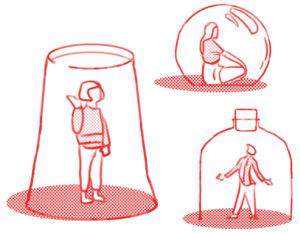
We have been designed for relationships. God did not create Man in a vacuum but in relation to Himself and to fellow mankind. “Isolation is not the divine norm for human beings; community is the creation of God,” said Bible scholar Kenneth Mathews.
Perhaps the key to coping with loneliness is to look beyond ourselves. We can look up at God and look out for others.
Looking up at God
1 God is our refuge and strength,
an ever-present help in trouble.
2 Therefore we will not fear, though the earth give way
and the mountains fall into the heart of the sea,
3 though its waters roar and foam
and the mountains quake with their surging.
Psalm 46:1-3
One way of overcoming loneliness is to once again come into the fellowship with our loving and gracious God who is always waiting for us to commune with Him. He is ‘our refuge and strength’ and in Him ‘we will not fear’. As we come into His presence with a sincere heart and with the confidence of what Jesus has done on the cross (Heb 10:19-23), we can gain strength from Him to ‘spur one another toward love and good deeds’.
Christians can take this opportunity to build ourselves up in our faith in Christ by going deeper into God’s Word. We can strengthen our spiritual disciplines of praying for others, worshipping personally and virtually with our community.
As we look up, we realise that though we are physically apart from people, we are not alone. God is near. We can ‘be still and know that He is God’ (Ps 46:10a).
Looking out for others
Therefore, as we have opportunity, let us do good to all people, especially to those who belong to the family of believers. Galatians 6:10
While we may meet virtually to have fun or find ways to overcome boredom, Christians can take this time to be even more intentional to look out for those in need.
There are many in society who are forced to be apart from their loved ones by circumstance. The pain that comes with the Circuit Breaker period would be more acute for them.
Couples with young children struggle with working from home and taking care of the kids. Their lives have become more challenging now that their parents and in-laws are no longer available to help them with child-minding due to social distancing measures.
Others in need are foreign workers who are experiencing a climbing rate of infections. They are away from home and loved ones, and now face the fear of not just losing their jobs but also their health.

Who are those around you that experience such needs? As a church, we can be more aware of these people and be more intentional to connect with them and to ‘do good to them’. Though we are physically apart, what can we do to show them that they are not alone?
Finally, let us look out for one another within the body of Christ. We may be physically apart because of the Circuit Breaker measures. But we need not be alone if our hearts are joined in our worship of Christ and our concern for one another.
______________________________
Reflect:
1) How are you handling loneliness during this period of Circuit Breaker? What could you do other than meeting up virtually to have fun with your Life Group, friends and colleagues?
2) Are there people around you that are more in need than yourself during this time? What can you do, within your ability and influence, to encourage or help them?
The man was attacked and left for dead on a country road. Two Jewish, religious people came by, looked at the scene, and scurried past. Perhaps they did not want to defile themselves by interacting with what may be a dead body. Whatever their motives, they moved on, concerned about other matters.
A third person came by, saw the man, drew near, and had compassion for the man. He was a Samaritan, a people group disliked by the Jews. He took care of the man’s wounds, brought him to an inn to rest, and even paid for the expenses.
The ‘Good Samaritan’ was a neighbour to the injured man (Luke 10:30-37).
Many of us have encountered this story. The Parable of the ‘Good Samaritan’ is a well-known even to the secular world. It prompted two social psychologists to study some seminary students training to be priests. They set up the students in two groups. Those who were hurrying to deliver a sermon on the ‘Good Samaritan’ and those who were unhurried in the same task. Along their way, each student would encounter a man ‘slumped in a doorway with his eyes closed, coughing and moaning, clearly in distress.’
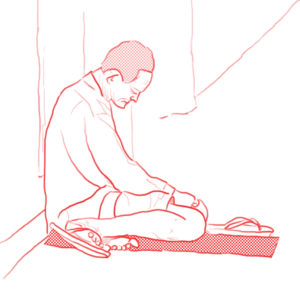
Would these seminary students stop to help a stranger in need? The researchers found that only 10% of the students who were hurrying stopped to help the man. In comparison, 63% of the students who were unhurried stopped to help.
Though the students had the ‘Good Samaritan’ in mind, hurry caused many of them to ignore a person in need.
The parable and the research strike close to our hearts today. COVID-19 has led to many needs around us. There are friends and family whose jobs are affected in this period. There are colleagues who may feel incredibly lonely due to the distancing. There are neighbours who struggle with fatigue as work intensifies in essential services. There are many people along the road we walk, each with many needs.
In such tough times, we have many concerns – our jobs, needs and problems. We may experience anxiety in keeping up with our tasks and preparing for the rainy days ahead. But just like the seminary students who were hurrying, these concerns may crowd out Jesus’s words, to “go and do likewise” and be a good neighbour (Luke 10:37).
The act of giving our time and our resources is an expression of trust that God is our provider and we are His channels of good works to the world. Though it may seem logical to look only to personal needs. But in Christ, we have the Gospel that frees us to do good in the world. While it may seem natural in the world that doing good is for those who have ‘plenty’. But in Christ, we have a Saviour that enables all of us to do good whatever our circumstances.
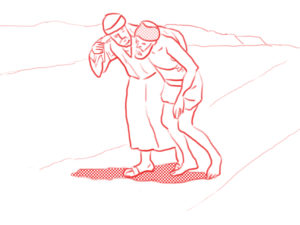
“For the grace of God has appeared that offers salvation to all people. It teaches us to say ‘No’ to ungodliness and worldly passions, and to live self-controlled, upright and godly lives in this present age, while we wait for the blessed hope – the appearing of the glory of our great God and Saviour, Jesus Christ, who gave himself for us to redeem us from all wickedness and to purify for himself a people that are his very own, eager to do what is good.” Titus 2:11-14
COVID-19 presents believers with an opportunity that we may forget or struggle to see in our everyday. The opportunity to be salt to the earth, light of the world. What a privilege we have!
“In the same way, let your light shine before others, that they may see your good deeds and glorify our Father in heaven.” Matt 5:16
Would we look up, draw near, and give attention to the needs around us? As we do so, we will come to see beyond their immediate needs to their deeper spiritual need. That is our opportunity to minister and share what Jesus has done for them on the cross. More than just a Panadol to their pain, we point them to Jesus and His Gospel, the ultimate ‘cure’ to their struggle in a sinful world.
Through our good works in Christ, we point Christ and His Gospel to the watching world.
The first question which the priest and the Levite asked was: “If I stop to help this man, what will happen to me?” But the good Samaritan reversed the question: “If I do not stop to help this man, what will happen to him?”
– Martin Luther King Junior
______________________________
Reflect:
- As we are channels of good works to the world, are we good neighbours to those around us? Whether we have plenty or little, let us pray and commit our concerns and our ‘hurry’ to Jesus as we step out to draw near to those in need.
- Believers find comfort, strength and hope in Jesus and the Gospel. As we minister to the felt needs in people around us, what can we do to point them to their deeper spiritual need? How prepared are we to share the reason for the hope that we have in Christ (1 Peter 3:15)?
Source: https://sparq.stanford.edu/solutions/take-time-be-good-samaritan
Because of Covid-19, there goes…
My freedom to go wherever I want.
My income for the next month.
My work-life balance as I work from home and take care of the kids.
My mental well-being as I struggle with tensions at home.
My trip to Japan that I was looking forward to.
It is natural to struggle with a sense of loss during this pandemic. Many of the things the virus took from us are associated with legitimate desires of companionship, security and freedom. Coping with the loss of these things can be challenging. It is also tempting to be preoccupied with getting them back.
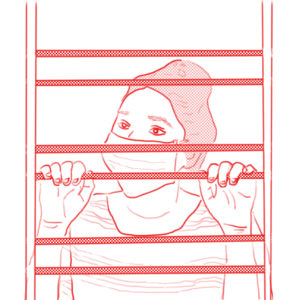
However, as believers, our lives need not be defined by what we have lost because we live for a higher purpose that no pandemic can take. We can focus on fulfilling God’s will while trusting that God knows what we need.
For the pagans run after all these things [needs in life], and your heavenly Father knows that you need them. But seek first his kingdom and his righteousness, and all these things will be given to you as well.
– Matthew 6:32-33 (NIV).
This is not a blanket promise that as long as we serve God we’ll have all of our desires met. We may feel an intense desire for something but it may not be what we truly need. God, not us, defines what we need. We can be assured that God knows what we require and He provides as He deems fit.
God provides for us according to His purpose. If it better serves His purpose that we’re in lack rather than in abundance, God may allow us to go through times when we are deprived of our earthly needs.
The apostle Paul, when he was imprisoned as a result of doing God’s work, offered a startling insight, “I know what it is to be in need, and I know what it is to have plenty. I have learned the secret of being content in any and every situation, whether well fed or hungry, whether living in plenty or in want. I can do all this through him who gives me strength.” (Philippians 4:12-13) (NIV).

Paul had come to terms with the physical hardships of prison and the emotional pain of dealing with opponents wanting to hurt him. He could do without additional monetary aid from the Philippians or the companionship of his friends as long as the gospel was advanced. For the sake of Christ, Paul lost his prestige, popularity, freedom and eventually, his very life. Yet Paul was content because he knew he was fulfilling God’s purpose for him.
In this crisis, we may face losses ranging from the trivial to the terrible. God knows what we have lost and what we need. He has already met our deepest need, the need for the forgiveness of our sins, through the cross. Since He was faithful in sending His Son to die for us, He will also be faithful to ensure we have all that we require to do His will, whether in times of peace or pandemic.
Being content frees us from our preoccupation with what we lack. It liberates us to emulate Jesus by looking out for others instead of fixating on ourselves.
A loss may be painful to bear, but it can be redeemed by God for His good purpose. Perhaps we are only able to see this clearly in hindsight. For now, we fix our eyes on Christ, who has turned the terrible loss of His own life into the marvellous gain of eternal life for us.
______________________________
Reflect:
- What is one loss you experience because of Covid-19? How are you dealing with it?
- Though he was in lack, Paul was content because he saw how God used him and his circumstances to accomplish His purpose (Phil 1:12-18). What do you think is God’s purpose for you at this point in time? How is your attitude different or similar to Paul’s? What would you want to change about your attitude?
After Covid-19, work, learning, leisure and travel would never be the same again.
So the world scrambles to adapt to the ‘new normal’. Businesses rapidly ramp up their efforts in digitization. Schools rush to bolster their online learning platforms. Workplaces hurry to implement safe management measures.
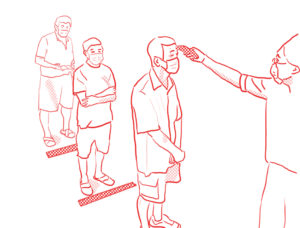
Change is the only constant, the world says.
However, what is more constant than change is God.
The world may be going through great changes now, but God remains ever righteous, ever wise, ever faithful (James 1:17).
When Judah was invaded by Babylon, their lives were turned upside down. They once lived in the Promised Land, enjoying riches and fame. Then they rebelled against God by indulging in idolatry and injustice. To punish their sins, God sent Babylon to take over their land and force them into exile.
When the Israelites were deported, they had little choice but to accept their new status as a conquered people and deal with new political leaders and social norms. They had to rebuild their lives from scratch in a foreign land.
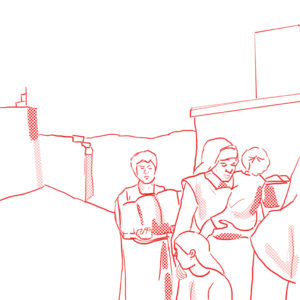
Despite all these, the Israelites still did not understand what God was trying to teach them (Is 42:25). Yet God continued to reach out to them with abounding grace.
But now, this is what the Lord says—
he who created you, Jacob,
he who formed you, Israel:
“Do not fear, for I have redeemed you;
I have summoned you by name; you are mine.
2 When you pass through the waters,
I will be with you;
and when you pass through the rivers,
they will not sweep over you.
When you walk through the fire,
you will not be burned;
the flames will not set you ablaze.
3 For I am the Lord your God,
the Holy One of Israel, your Savior;
I give Egypt for your ransom,
Cush[a] and Seba in your stead.
4 Since you are precious and honored in my sight,
and because I love you,
I will give people in exchange for you,
nations in exchange for your life.”
– Isaiah 43:1-4 (NIV)
In Isaiah 43:1-4, God graciously promised to redeem Israel from captivity and sin, assured them that He did not mean to destroy them but to discipline them, and reaffirmed His commitment to them.
Though everything around the Israelites had changed, God remained faithful to His covenant with them.
Today, though the circumstances around us have changed, we can anchor ourselves in God’s unchanging nature. God will keep the promises He has made to His people, the Church. We can take Him at His word because He has proven Himself trustworthy when He gave His Son as the Sacrificial Lamb. Jesus died for our sins so that we would not have to.
Therefore, we may not be sure why God allowed the pandemic to happen, but we can be sure of His faithfulness. We can be certain that He is with us in the midst of our storms.
Since God is the only constant in life, it is only reasonable that we think long and hard about how we have been walking with Him.
In the many crises He made Israel go through, God did not intend for the Israelites to just endure the hardship till it was over. He wanted them to proactively alter the way they related to Him and others.
Even as we adapt to the new reality created by Covid-19, perhaps we should also be creating a ‘new normal’ in our walk with God that will take us deeper into His grace.
______________________________
Reflect:
- What needs to change in your walk with Christ? Why is that change needed?
- How would you make that change? What practical steps would you take?
The late renowned apologist Ravi Zacharias once said, “Make wise decisions in the light because it will stand you in good stead when you are in the dark.”
The pandemic has plunged us into dark times. Ironically, this darkness can be illuminating. It reveals what we truly believe and lays bare the foundations of our faith.

When we were in the “light”, or when we were doing well, we carried on with our routines or expected behaviours without much thought. After some time, we could have forgotten or neglected the values and reasons behind why we do what we do.
When our routines are disrupted by the pandemic, we begin to feel the impact of the change in lifestyle. Some may even feel a sense of loss because we are so used to certain activities, events or ways of doing things.
This is true even for the Christian life, and it challenges us to reflect on our inner life.
One area our lives have been disrupted is in the way we worship. Now that we cannot gather physically for worship, some miss singing together. Others miss the live music. When we meet online, we can only listen to the person leading the session. We cannot hear other voices worshipping together.
This changes our worship experience. Does the dip in atmosphere take away the value and purpose of worship? Can we still focus on God without the lights and surround sound that we are used to? When our senses are less engaged, can we still worship the Lord in one spirit and encounter His presence?
Another disruption we experience is the increase in time we are confined to our homes. Has our additional time spent with spouses, children and family been more fruitful and enriching? Or have our relationships become estranged and tense? As our love for others is tested, can people witness the effect of Christ’s grace and mercy in our lives?
During this period when our faith is tested, what is being revealed of ourselves? Is Christ being seen in us?

The foundation of our faith was built in the early days of our walk with the Lord. The pandemic may reveal gaps in our foundation that we did not notice until now. Maybe our understanding of worship has been shallow or incorrect so far. Perhaps we’re not as loving as we thought. Now is the time to humbly admit our lack and fill the gaps by turning to godly mentors and holy Scripture.
Paul reminded Timothy and the Ephesian church in 2 Timothy 3:14-15, “But as for you, continue in what you have learned and have become convinced of, because you know those from whom you learned it, and how from infancy you have known the Holy Scriptures, which are able to make you wise for salvation through faith in Christ Jesus.”
Whether we are in our formative years of spiritual life or we have walked with God for an extended time, we can treat this period of revelation as a period for refinement. For instance, will we humbly look to learn from those who mentor and lead us?
Let’s not simply go through the Circuit Breaker period. Let’s grow through it by equipping ourselves with God’s truth (2 Tim 3:16-17). Let’s heed Zacharias’ advice to “make wise decisions in the light” by investing in our growth now, for we know that darker periods of testing will come as we draw near to the Day of the Lord.
______________________________
Reflect:
- How has your faith been tested so far? How has the pandemic challenged your views, values and even behaviour?
- What are some ways to strengthen and build yourself up in the Lord during this Circuit Breaker period?
For some of us, our prolonged stay-at-home might see an increase in conflicts – especially within the household. It may be the small things – quarrelling over house chores, arguing over incessant noise, or even fighting over Wi-Fi bandwidth because of gaming.
For some families that have been busy with pursuing personal lives and careers, awkward or chilly conversations may reveal the distance in the relationships that live closest to us.
Whether our families react passive-aggressively or explosively, quarrels could even escalate as ‘hurt people hurt people’. Unmet needs. Angry thoughts. Hurtful words. They may emerge and be all too familiar to us. We might have our own share of anger and frustration as well.

As we grapple with the tension at home, we can find understanding from Jesus’ words in Matthew 5:21-24. Jesus cuts to the heart of the matter of murder and addresses anger as the root issue.
When conflicts occur, the anger we feel is often self-righteous. We insist that we are right. We try to prove that we know better. We argue that we deserve more. In the course of it, we may inflict hurt on others or manipulate them into doing what we want. Though we sought for understanding and respect, anger does not get us what we want. Instead it may reveal selfish and unloving sides of ourselves and drive away the people we love.
What emerges out of these conflicts – the anger within, the insults thrown (or thought), and the demeaning treatment (v21-22) are really attempts to destroy and strip away the other party’s personal identity. Though not physically murder, they ‘murder’ and take away people’s value and identity as God’s creation.
The heart of the problem is the anger that brews in us. To this, Jesus warns of judgment, and points God’s people to respond differently in v23-24.
If you are offering your gift at the altar and there remember that your brother or sister has something against you leave your gift there in front of the altar. First go and be reconciled to them; then come and offer your gift. Matthew 5:23-24
Jesus addresses the seriousness of unresolved anger and reveals the antidote – reconciliation. Reconciliation takes precedence even over offering worship – whatever song we sing or object we give to honour God. To reject our wrongs and leave problems unreconciled is to allow the sin that has come between relationships to continue to destroy those same precious relationships.
Covid-19 season may reveal the cracks in relationships that already existed before the pandemic. But this season also presents the opportunity for us to reconcile and strengthen the relationships around us.
Although in this passage Jesus was teaching about reconciliation in the context of relationships with brothers or sisters in Christ, this points us to the ‘distinct’ perspective believers ought to have across all relationships, including family relationships. We pursue humility and not self-righteousness. We humbly seek to reconcile. It is this distinctiveness that points the people around us to Jesus and His Gospel.

To unravel conflicts, confront sin and reconcile relationships can be a daunting task. We may have wronged others and will need to humble ourselves. We may have been wronged and will need to forgive others. We may not feel like we have enough strength to apologise or forgive.
Yet we do not need to conjure up our own humility or mercy. For in Christ, we have the greatest role model to follow in laying down our rights in humility (Phil 2:3-4). In the Gospel, we who have been forgiven of our sins have the strength to forgive others (Col 3:13).
Prayer from Francis of Assisi
Lord, make me an instrument of your peace:
where there is hatred, let me sow love;
where there is injury, pardon;
where there is doubt, faith;
where there is despair, hope;
where there is darkness, light;
where there is sadness, joy.
O divine Master, grant that I may not so much seek
to be consoled as to console,
to be understood as to understand,
to be loved as to love.
For it is in giving that we receive,
it is in pardoning that we are pardoned,
and it is in dying that we are born to eternal life.
Amen.
______________________________
Reflect:
- Is there anyone in your life right now who might have ‘something against you’ (Matt 5:23-24)? Perhaps this season could be an opportunity to acknowledge our wrongs and seek reconciliation. Whatever the outcome, God honours our humility.
- Are there particular people in your life, especially your family, who is a source of tension and quarrels? What can we do today to unravel the conflict and address the danger of anger in us?
Shops re-opening. Queues forming at McDonalds. Kids going back to school. It seems like life is cautiously but gradually going back to a ‘new normal’. It is easy to go with the flow and begin to make plans of the 101 things we want to do as we transit out of our stay-home situations.
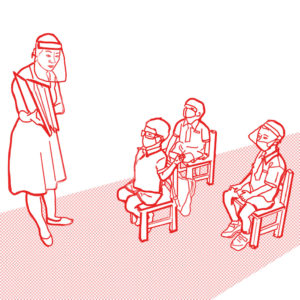
But before we get lost in the new routines or in the grind of things, it pays to have a moment of reflection and consolidation. What might God have spoken to us in the past two months?
Times of crisis and suffering shake up the system and order of our lives. Amid uncertainty, they reveal what lies in our hearts. What has been competing for space in our relationship with God? What might we love, perhaps even more than Him? To this, God now invites us to reorder our loves.
The Bible narrates a story of a wealthy and upright man named Job who followed after God. Over a period of intense difficulty and pain, Job lost his wealth, health, family, dignity and reputation. But even in the deep depth of despair, what he did not lose was his faith in God.
At this, Job got up and tore his robe and shaved his head. Then he fell to the ground in worship and said:
“Naked I came from my mother’s womb,
and naked I will depart.
The Lord gave and the Lord has taken away;
may the name of the Lord be praised.”
In all this, Job did not sin by charging God with wrongdoing.
Job 1:20-22

Job was honest with God about his unhappiness, grief and pain. He lamented to God in confusion and frustration at all that had happened. He was even urged to curse God, but he never said, “I don’t need you God.” (Job 2:9-10) Job did not hold these things (that he had lost) above who God is in his life. Job still worshipped God as God.
Most of us dislike being in a state of confusion or uncertainty. We look forward to the ‘new normal’ because life will now have some semblance of predictability once again. But what if our prior way of life has shown us the things we love but competed with God?
In our eagerness to regain the certainty of our days, let us not lose sight of what God has taught us and revealed to us during this uncertain time. Let us keep watch over our hearts to not simply fall back into similar and familiar patterns. Let us consider what the ‘new normal’ can look like when we worship God as God.
What are the essentials that we need to have? What are the ‘optionals’ that we can do without? What does it look like if we reorder our loves as we rebuild the routines of our lives?
Then Jesus declared, “I am the bread of life. Whoever comes to me will never go hungry, and whoever believes in me will never be thirsty.” John 6:35
Our relationship with God is essential to life. More than our physical needs, Jesus’s words point us to Himself. He is the source of eternal life. In Him, we will never hunger or thirst in the eternity to come.
Living in this world, we may see, hear and experience many sources of gratification. They jostle for our attention and promise to be what satisfies. Yet none of them compares to Jesus who is our bread of life. He is the Son of God who loved us and gave Himself up for us to pay the penalty of our sins. He restores our relationship with God. He is essential to life.
Stepping forward into the ‘new normal’, let us reorder our loves and keep our Lord to be first in our lives.
______________________________
Reflect:
- How has God spoken to you in the past two months? As we reflect, what areas of our lives compete with God for space?
- What are things you look forward to as we enter the ‘new normal’? How can you set new norms that will reorder your loves?
If someone had said last year that we would be worshipping together through a screen in our own homes, nobody would have believed that. Yet that has become our reality for most churches around the world.

While church leaders figure out how to overcome the technological challenges, believers grapple with the foreignness of this unusual medium. You may have heard it said, ‘I miss the worship in church.’ Or thought, ‘I wish we could have our usual worship environment.’
Navigating this change needs time for adjustment. But as group gatherings still loom distant, this presents an opportunity to reflect – what is worship? Does the change in environment affect our worship unto God?
In the Book of Romans 1-11, Paul paints a stirring picture of the gospel. In His mercy, God sent His Son, Jesus, to die for the sin of man so that we do not have to die. As we recognise all that God has done for us in His Son, Paul now answers the implicit question – ‘so what?’ In one of the best-known passages in the Bible, Paul exhorts the believer’s response:
Therefore, I urge you, brothers and sisters, in view of God’s mercy, to offer your bodies as a living sacrifice, holy and pleasing to God—this is your true and proper worship.
Romans 12:1
For believers who have understood God’s grace and its place in our lives, offering ourselves to God as living sacrifices is our ‘reasonable’ act of worship. We do not offer ourselves ignorantly like animals of sacrifice. We offer to God consciously and willingly, through the living of our entire Christian lives as acts of worship.
“Worship is not one segment of the Christian life among others. Worship is the entire Christian life, seen as a priestly offering to God.”
– John Frame
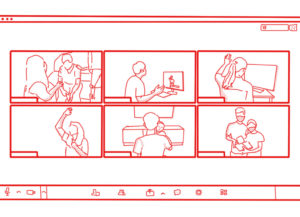
From this, it becomes clear to us that worship is not just part of the program in Life Group or weekend Services where we sing some songs together in a church building. Instead, worship is firstly the offering of our whole lives to God. As we do so, worship also refers to the personal and corporate habit of ascribing honour and worth to God, expressed through singing, playing music, clapping and more.
It is this environment of singing together that has greatly changed in the past months – hence, we may be tempted to think worship has changed. But worship is not about us, our preferences of what is ‘ministering to us’, or the environment we worship in. ‘Good’ worship goes beyond the atmosphere of the session and the quality of singing; its message invites us to worship the God revealed in the Bible.
Worship does not change based on circumstances. Worship is about God, and God’s mercy has never changed.
Since the object of our worship is still ever-worthy, and since we are not coming before a screen but before God Himself, that should be reflected in how we can be fully engaged in our worship unto Him. We don’t have to wait for the worship leader to motivate or inspire us; we are ready to give honour to the King from wherever we are.
There will be many more weeks where we will worship together as a body, but apart in our own homes. The distance may make us feel like spectators, but today God is drawing us near to be worshippers. Sometimes practical changes may also help. Wake up in time to freshen up before worship service begins. Sing it out and not just listen to the people on the screen. Lift our hands and express our delight in Him. Meditate on the lyrics and our response to the Gospel of Christ. Turn our living rooms to be our altars of worship.
Today is an invitation for us to return to the heart of worship itself, the offering of our lives as living sacrifices (Matt 15:8-9) beyond the words of song. In view of God’s mercy, let us worship.
______________________________
Reflect:
- Offering ourselves as ‘living sacrifices’ to God is our reasonable act of worship. How does knowing the unchanging and ever-worthy God have an impact on your everyday worship?
- What posture should we adopt as we worship together as a body in our online gatherings, while apart in our own homes?
With the Covid-19 pandemic still raging in many parts of the world, most countries have closed their borders.
At first glance, it may seem like the pandemic has dealt a heavy blow to missionary work. Some missionaries have left their mission fields due to high rates of infection and lack of medical care. Most, if not all, short term mission trips have been put on hold. Mission agencies have stopped sending their workers overseas.
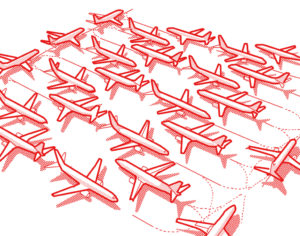
On the other hand, there are missionaries who stay on in the mission fields. Some are infected with the virus, while some are grappling with financial issues. Yet they continue to minister to people, even sending food and monetary aid to those in need. They also learn to deal with social problems in places where people have resorted to stealing food, looting and robbing.
The pandemic, as frightening and damaging as it is, cannot derail God’s work in the nations. God continues to work through willing and selfless servants to offer the Gospel wherever they are, to whoever they meet, in whatever way they can.
Paul and Barnabas gave their lives to God’s commission, “‘I have made you a light for the Gentiles, that you may bring salvation to the ends of the earth (Acts 13:47).” No challenge or difficulty could make them forgo God’s command. The fiercer the opposition, the more tenaciously they held onto their mission, the more they saw God’s mighty hand at work in drawing people to His kingdom.
God is still looking for willing and selfless servants today (Mt 9:37-38). The pandemic, with the great uncertainty it brings, has given rise to a harvest full of people who are lost and desperate for hope and answers. Now is an opportunity for God’s servants to bring the message of hope in Jesus to those who are seeking.
God has even provided the tools. Support for missionaries can be given through frequent communication and prayers online. Wiring of financial aid to missionaries is available in some countries. Continuous training and equipping can be done over video calls and online videos.

Virtual communities are created to both support and encourage people in the Lord. Facebook block parties, Instagram live, Zoom meetings and the likes are avenues where the gospel of Christ has been shared and received.
The possibilities are endless. So let’s press on in sharing the message of hope in Christ. Any mission is possible when God is in it.
______________________________
Reflect:
- How can we be involved in missions in the midst of the pandemic? Can we connect with someone we know oversees and share the Gospel to them? Or are there foreigners living in our midst that we can be intentional to connect with, to bless them and to bring the message of salvation to them?
- Are there missionaries whom you know need encouragement and help during this period of uncertainty? How can you do your part to support them?
If you would like to know how to get involved in missions, write to [email protected]
With Christ in the vessel we can
Smile at the storm
Smile at the storm
Smile at the storm
With Christ in the vessel we can
Smile at the storm
As we go sailing home
If there is one song that defines the Christian’s experience of the coronavirus crisis, With Christ in the Vessel may be it.
As we ease into the ‘new normal’, the possibility of getting infected still looms over us like a dark cloud.
To cope with the prevailing uncertainty, many of us focus on silver linings. We applaud healthcare workers. We share photos of ourselves visiting our families or eating out with friends. We cheer at news of a possible vaccine.
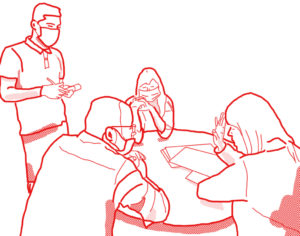
These little sparks of positivity may help to keep us going in this gloomy climate, but their effects do not last. However optimistic we try to be, we can’t shake off the uneasiness that we still live in a world where the virus has infected nearly 10 million people and killed almost half a million.
Even if a vaccine could solve the current crisis, it is unable to prevent future pandemics caused by other viruses. If we place our hope in medical advances, we would be easily shaken if new illnesses, perhaps more contagious and deadlier than Covid-19, emerge.
During these turbulent times, God wants us to exercise faith by taking Him at His word despite what we see. Faith is not denying the reality we live in. Faith is facing the facts head-on and choosing to obey God as we wait for Him to fulfil His word.
All these people were still living by faith when they died. They did not receive the things promised; they only saw them and welcomed them from a distance, admitting that they were foreigners and strangers on earth. – Hebrews 11:13
Israel’s forefathers passed away before they could enter the Promised Land. Yet they did not waver in their faith. They knew that Mesopotamia, where they came from, was not their home and thus saw themselves as foreigners. They looked forward to “a better country – a heavenly one” (Heb 11:16) that God had prepared for them.
Like Israel’s forefathers we are pilgrims on this journey of faith passing through this world and making our way home to the inheritance that God has promised us. We would arrive at our Promised Land only after our life on this earth is over.
Perhaps all the pain and anxieties we struggle with now are merciful reminders that the life we have in this world is not our final state. They would soon give way to complete joy and peace in the future when God puts things right.
This does not mean that life now is all gloom and doom. In our communion with the Spirit, we have a foretaste of how wonderful eternity with God will be. With Christ we can smile at the storm, not because we make light of the suffering it brings or are shielded from its impact, but because we know that God will not let it stop us from reaching our future glory (Rom 5:2-5; 8:22-25, 38-39).
Meanwhile, we take one day at a time. We give thanks to God for the simple pleasures in life (Ecc 2:24). We are faithful to accomplish God’s purpose for us. We are confident that with the same power He used to raise Christ from the dead, He can empower us for godly living in this fallen world (Eph 1:19b-23).
With Christ in the vessel we can smile at the storm, as we go sailing home.

______________________________
Reflect:
- What does being a pilgrim on a journey of faith mean to you? How does it change your perspective on the ups and downs you experience in life?
- During this Covid-19 crisis, how has God been teaching you to live by faith and not by sight?